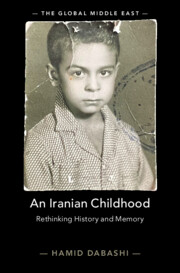Book contents
- An Iranian Childhood
- The Global Middle East
- An Iranian Childhood
- Copyright page
- Dedication
- Contents
- Figures
- Acknowledgments
- Prelude
- 1 My Memories of Our Forgetfulness
- 2 Once Upon a Moonlight in the Merry Month of June
- 3 The House on Ardeshir Street
- 4 My Elephant Was Dreaming of India
- Epilogue
- Works Cited
- Index
4 - My Elephant Was Dreaming of India
Published online by Cambridge University Press: 13 April 2023
- An Iranian Childhood
- The Global Middle East
- An Iranian Childhood
- Copyright page
- Dedication
- Contents
- Figures
- Acknowledgments
- Prelude
- 1 My Memories of Our Forgetfulness
- 2 Once Upon a Moonlight in the Merry Month of June
- 3 The House on Ardeshir Street
- 4 My Elephant Was Dreaming of India
- Epilogue
- Works Cited
- Index
Summary
In this chapter I describe in some detail the earliest signs of puberty and emerging adulthood. But perhaps more pointedly, I describe how toward the end of my high school years at Dr. Hesabi, a certain degree of impatience and vague anxiety was settling in me, for which I had no explanation, or even full consciousness. I always thought I needed to be somewhere else than where I was. The more books I read and the more movies I watched, the farther I moved away from our neighborhood and my family and friends. I was with them and continued to be what I was. But a sudden distance had started to settle in me between where and what I was and where and what I thought I should be. The age of puberty was creeping up on me, and the distance between where and what I was and where and what I thought I should be had by now become palpable. I was always a stellar student and continued to do my assignments like a robot. But my agitations came from somewhere else. I was reading like termites eating through books and buildings, drawn to both Russian and American literature as much as to Persian. I had no taste or patience for European literature – French, English, or German. Russian literature was a major staple of the Iranian literary scene since the early twentieth century, but after World War II, American literature had become as compelling. Mark Twain, William Faulkner, Ernest Hemingway, and John Steinbeck were being actively translated into Persian. These recollections become the premise of how I marked the last few years of my childhood and my sudden entry into adulthood.
Keywords
- Type
- Chapter
- Information
- An Iranian ChildhoodRethinking History and Memory, pp. 160 - 194Publisher: Cambridge University PressPrint publication year: 2023



